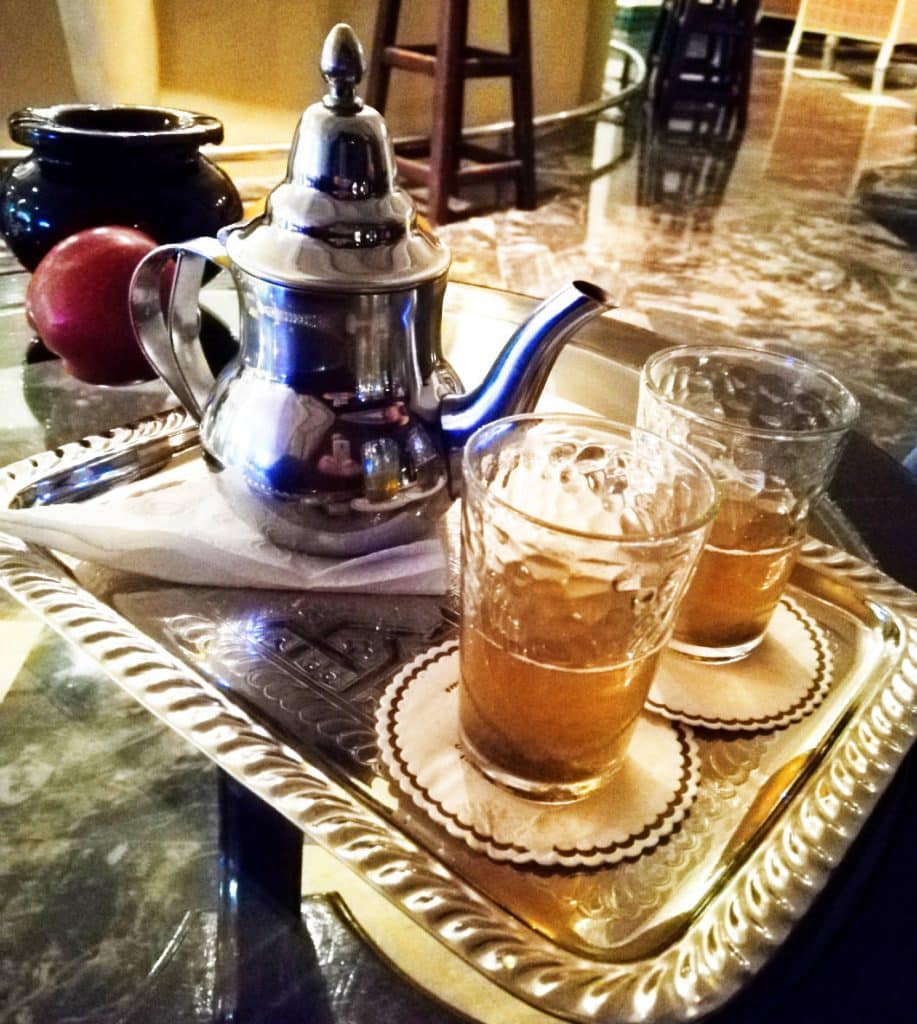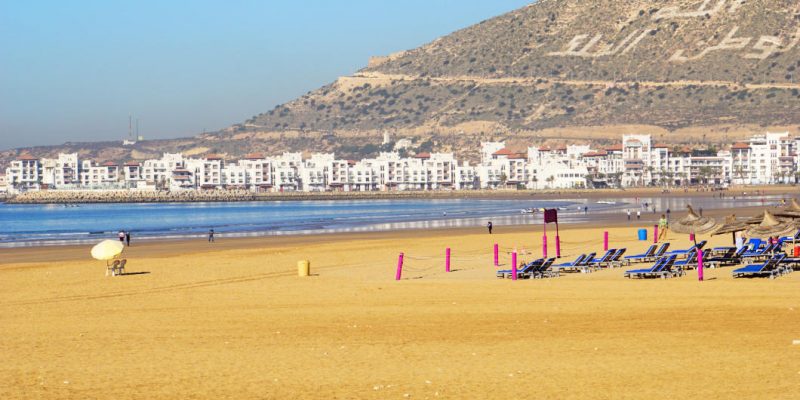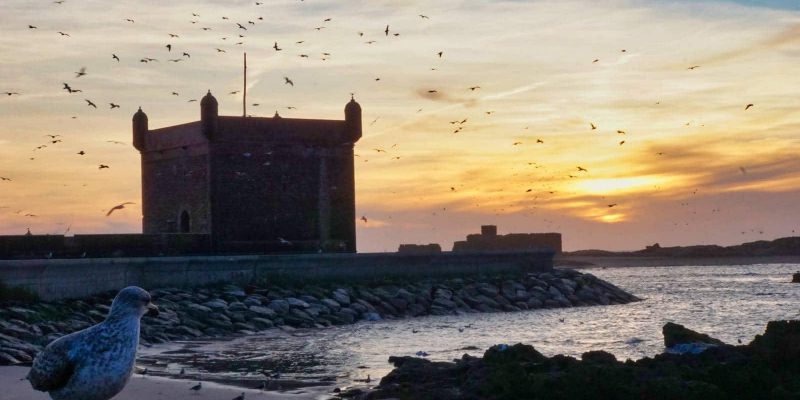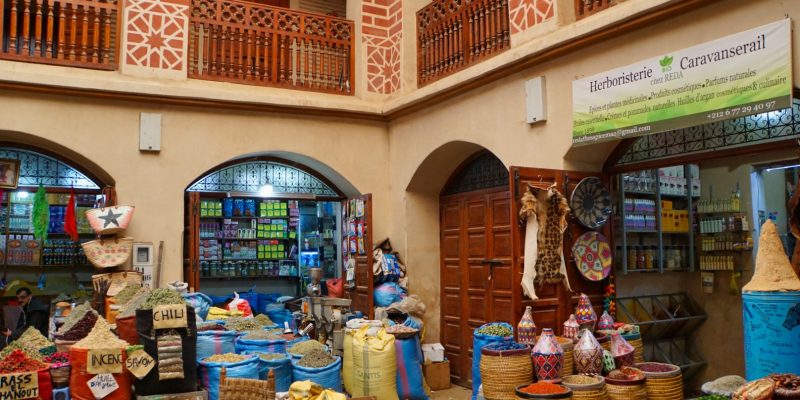When you travel to Morocco, you think of colorful markets, ancient cities and, of course, the desert. This is the gateway to Africa, where you can experience oriental charm. With a good number of direct flights from many European cities, Morocco is easy and often cheap to reach, ideal for a wonderful vacation.
The Kingdom of Morocco is located in the northwest of Africa. It borders the Mediterranean Sea to the north and the Atlantic Ocean to the west. Algeria lies on the eastern border. The territory of Morocco is geographically very diverse. In addition to the coastal regions, the hinterland is home to the distinct mountain ranges of the High and Middle Atlas, the Rif Mountains and the Anti-Atlas. Morocco is also home to the fringes of the Sahara.
In this African country, different cultures come together and with Berber, Arabic, African and European influences, a wonderfully colorful world opens up. Historic cities such as Marrakech, Fez and Meknes are full of magnificent architecture, old medinas and lively souks, which are UNESCO World Heritage Sites.
The country is famous for its artistic handicrafts, including ceramics, leatherwork, carpet weaving and metalwork. One or two travelers are sure to discover a souvenir of their vacation in the small stores.

Moroccan cuisine is world-famous for its variety and taste, which is characterized by the use of spices such as saffron, mint and cinnamon. Classic dishes such as couscous, tajine and pastilla offer an incomparable taste experience. The hospitality of the Moroccans should not be forgotten. Visitors are often welcomed with a glass of mint tea and have the opportunity to get to know the local way of life.
Morocco offers a wide range of activities for the adventurous – from camel trekking and sandboarding in the Sahara to surfing on the Atlantic coast and hiking or skiing in the Atlas Mountains. Those who prefer to lie on the beach in peace and quiet will find beautiful stretches of coastline that make for a relaxing vacation.
Morocco: Destinations

On the Atlantic Ocean, about 500 kilometres from Casablanca, lies the Moroccan port city of Agadir. The city is known for its beaches and is a popular holiday destination not only among foreign tourists.

If you want to answer the call of adventure while still enjoying relaxing days, then Essaouira in Morocco could be the ideal destination. This charming coastal town is a hidden gem that welcomes its visitors with open arms and an Atlantic breeze.

Marrakech is located at the foot of the High Altas and is one of Morocco's royal cities. The city is also nicknamed the "Pearl of the South" and was once an important caravan port in Morocco.
Book an excursion
Information for a vacation in Morocco
Arrival
There are 15 international airports in Morocco. There are numerous air connections to the country, many of which bring tourists to Agadir.
By ship, for example, you can enter Tangier on car-passenger ferries from southern Spain.
The national German driver’s license is sufficient for a stay of 3 months. Those who wish to stay longer in the country must apply for a Moroccan driver’s license.
Within the country, it is possible to travel through large parts of the country by train or via the well-developed roads, especially in the northwest. It is not possible to drive across the border into Algeria.
Within the cities there is a lot of taxi driving. Small taxis drive only within the city, larger taxis also drive on routes outside the city.
Entry and visa requirements
Anyone entering Morocco from Germany requires a passport valid for at least 6 months and a valid return flight ticket. An identity card is not sufficient for entry into Morocco!
A visa is no longer required since 2019!
Travelers from other countries should contact the Moroccan embassy in advance.
If you wish to enter the country with your vehicle, you must also take it out again. A green insurance card is required.
On the road in Morocco
By train:
The ONCF (Office National des Chemins de Fer) operates the rail network in Morocco, connecting the main cities along the Atlantic coast and inland, including Casablanca, Rabat, Marrakech, and Fez. The high-speed train “Al Boraq” connects Tangier with Casablanca and significantly reduces travel time.
By bus:
There are numerous bus companies offering both intra-city and inter-regional connections. Large cities such as Casablanca, Marrakech and Rabat have their own urban bus networks. For longer distances between cities, companies such as CTM and Supratours are popular, offering comfortable and reliable services.
By shared cab (Grands Taxis):
Grands cabs are a popular and flexible transportation option for short to medium distances and often connect cities or their suburbs. These vehicles, usually older Mercedes-Benz models, take several passengers who share the cost of the journey.
By streetcar:
Some Moroccan cities, such as Rabat and Casablanca, have modern streetcar lines that play an important role in urban passenger transportation. They offer an efficient and inexpensive way to get around these cities.
With city buses and minibuses:
In urban areas, city buses and smaller minibuses complement the public transportation network. They are often cheaper, but may be less comfortable than trains or intercity buses.
Best time to travel to Morocco
Spring (March to May):
Spring is ideal for most regions, especially for hiking in the Atlas Mountains and visiting cultural centers such as Marrakech, Fez and Meknes, where nature is in bloom and temperatures are pleasant. In the Sahara it can get quite warm during the day, but the nights remain cool.
- Average temperatures: 10°C to 25°C, warmer in the south and east
- Rainy days: Varies; generally less rain than in winter, especially in April and May
Summer (June to August):
The coastal cities such as Essaouira, Casablanca and Agadir offer a pleasant cool down. However, the heat inland, especially in Marrakech, Fez and the Sahara, can be overwhelming. At night, the temperature drops significantly in the desert.
- Average temperatures: 20°C to 35°C, even hotter in some desert regions
- Rainy days: Very few; the summer months are mostly dry, especially in the interior of the country
Fall (September to November)
- Average temperatures: 15°C to 28°C, beginning to cool down, especially in November
- Rainy days: Increase in November, especially in the north and on the coast
Winter (December to February)
Winter is the best time to visit the cities along the Atlantic coast and for winter sports in the Atlas Mountains. In the more southerly regions and the Sahara, the days are mild and sunny, but the nights can be very cold.
- Average temperatures: 8°C to 20°C, colder in the Atlas Mountains and in the north
- Rainy days: Higher compared to other seasons, especially in the north and on the coast
Currency
In Morocco, payment is made in Dirham (Dh, MAD). There are the following banknotes: 200,100,50,25,20Dh and coins in 10,5,2,1 and ½ Dh, as well as 20 and 10 centimes. Dirham are only available in Morocco and cannot be purchased abroad.
In larger cities you will find many ATMs where you can withdraw cash. In small towns and remote areas, you should expect only cash to be accepted.
It is not allowed to import or export cash sums. However, up to 1000 Dh per entry and exit is usually tolerated.
It is possible to exchange the money back into foreign currencies. In this case, the regulations apply:
-
up to 48 h stay in the country – 100% of the amount exchanged at the time of entry
-
more than 48 h stay in the country – 50% of the amount exchanged at the time of entry
Language
About 90% of Moroccans speak Moroccan Arabic (Darija). There is also a wide population group that uses Berber language (e.g. Mazirian).
Officially, Arabic, Tamazight and French are spoken in Morocco. English is becoming increasingly important among some segments of the population. In the vacation regions, many Moroccans also speak German very well.
Clothing
It is recommended to dress respectfully. This means skimpy clothing belongs only on the beach. There it is also possible to swim in trunks, bikini or swimsuit, nudism or topless bathing is strictly forbidden for women in Morocco.
Otherwise, you should keep your armpits and knees covered if possible. Especially in summer temperatures, long and airy clothes are especially good.
Telefon, Internet
Since Morocco does not fall within the tariffs of the EU, there are rooming costs when making phone calls. It is recommended to purchase a phone card from a local provider.
We bought a 10 GB card for 10€ (as of 2019) from Orange directly at the airport. With this we got along very well.
There are two major network providers (Maroc Telecom and Meditel) that have very good network coverage within the country. In the meantime, I read that there is a prepaid card from Maroc with which you can surf unlimited for a month.
Health
The medical care is not comparable with the general care in Germany. It is recommended to take out a travel health insurance.
It is warned not to drink non-packaged water, to brush teeth or to take it in ice cubes. Here there is an increased risk of intestinal infection.
Plug
No travel plug is required. Type C and E sockets are used in Morocco.
Tip
The income in Morocco is very low. For many residents the tip or baksheesh is an important source of income. Often the tip is expected and sometimes even demanded.
If you want to make it easy for yourself, you can orientate yourself by the following values:
- In the hotel for maid, porter, waiter 3-15 Dirham. A little tip, if you give something during your stay, the service often improves.
- In restaurants 10-15% of the bill is appropriate as a tip.
- On excursions, you pay guides up to 100 Dirhan, depending on their personal commitment. For bus drivers, the value of the tip is about 20-50 Dh.
Often for photos, for example of the camel on the beach of Agadir, a financial consideration is also expected.